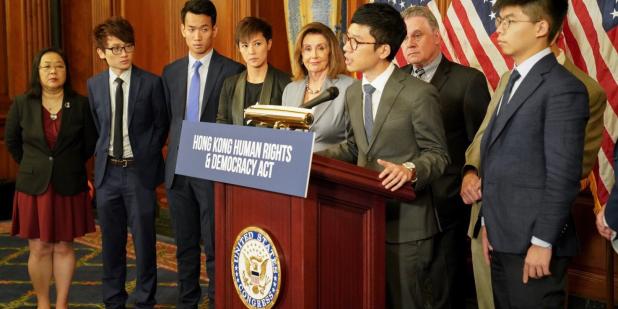Join us for a free one-day workshop for educators at the Japanese American National Museum, hosted by the USC U.S.-China Institute and the National Consortium for Teaching about Asia. This workshop will include a guided tour of the beloved exhibition Common Ground: The Heart of Community, slated to close permanently in January 2025. Following the tour, learn strategies for engaging students in the primary source artifacts, images, and documents found in JANM’s vast collection and discover classroom-ready resources to support teaching and learning about the Japanese American experience.
American perceptions of China

Activists including Joshua Wong and Nathan Law met House Democratic leader Nancy Pelosi and Representative Chris Smith at the US Congress.
American public opinion towards China has become increasingly unfavorable in recent years. Some of the decline can be attributed to partisanship within the United States. Republican political consultants (2020 | 2021 | 2022) have encouraged candidates to “blame China and those who aren’t tough on China” for the pandemic and economic anxieties. But criticism of China is not limited to one side of America’s political spectrum. People identifying as Democrats and independents have also become more negative in their thinking about China and Democrats are pushing legislation to strengthen U.S. competitiveness with China. The Pew Research Center noted that members of Congress, especially Republicans, dramatically ramped up their social media posting about China in 2020, but cut way back in the first months of 2021. Trade tensions and opposition to Beijing's policies in Hong Kong and Xinjiang account for much of American negativity attitudes toward China. Pew data, though, show that Americans aren't alone in having an increasingly unfavorable view of China.
The Gallup organization has carried out surveys on American attitudes toward China and American policy toward China for decades. For example, after his February 1972 trip to China, Richard Nixon's approval rating bumped up to 56%, up from his 49% average. In 1979, after the establishment of diplomatic relations, 64% of those surveyed had a favorable opinion towards China. In spring 1989 72% had a favorable view. That coincided with Pres. George H.W. Bush's visit to China and was ahead of the violent suppression of popular protests in Beijing and elsewhere in June. In spring 2021, just 20% told Gallup's pollsters they had a favorable view of China, a record low. Last summer, 50% of those surveyed by the Chicago Council on Global Affairs said that U.S. foreign policy should seek to "limit China's influence around the world."
Over the next few weeks, results from spring 2022 polls will be released. It’s possible that the Beijing Winter Olympics, the February 4th Russia-China proclamation, China’s responses to Russia’s invasion of Ukraine and continuing concerns about supply chain woes and inflation will impact attitudes. This week we feature a November 2021 video interview with Richard Wike, director of Global Attitudes Research at Pew and data from Pew's surveys. These polls are carefully constructed and executed and are highly regarded. Wike has great expertise in this area and in 2013 spoke at USCI’s Tinted Lenses conference.
Featured Articles
Please join us for the Grad Mixer! Hosted by USC Annenberg Office of International Affairs, Enjoy food, drink and conversation with fellow students across USC Annenberg. Graduate students from any field are welcome to join, so it is a great opportunity to meet fellow students with IR/foreign policy-related research topics and interests.
RSVP link: https://forms.gle/1zer188RE9dCS6Ho6
Events
Hosted by USC Annenberg Office of International Affairs, enjoy food, drink and conversation with fellow international students.
Join us for an in-person conversation on Thursday, November 7th at 4pm with author David M. Lampton as he discusses his new book, Living U.S.-China Relations: From Cold War to Cold War. The book examines the history of U.S.-China relations across eight U.S. presidential administrations.




